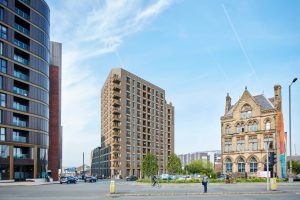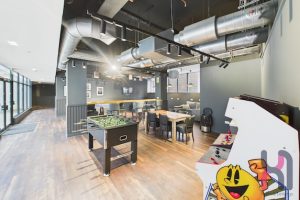Out of Town: Soapworks

OF ALL the schemes that have clamoured for kick-start funding from the new Evergreen Fund, it is easy to see why the £25m Soapworks was named as one of the beneficiaries for the first round of funding.
Details of how much it will receive have yet to be confirmed, with the amount largely dependent on whether the project wins its bid for cash from the initial pot of Regional Growth Fund money.
Regardless of this, Carlyle Group’s European real estate director Ben Du Boulay said that it is progressing with plans to redevelop the former Colgate-Palmolive factory at Ordsall in Salford into a scheme containing more than 400,000 of office space as well as ground floor retail, restaurants, cafe and gym space.
The factory which produced soap, toothpaste and other toiletries for more than 100 years before Colgate-Palmolive decided to move production to Poland in 2008. At its height, more than 1,000 people worked in the building, but this declined to around 300 by the time it closed.
Joint development partner Nikal completed a deal to buy the site in May 2008 ahead of its closure in the November of the same year. Carlyle Group bought the 8.42-acre site in October 2008.
Since then, a scheme has been worked up by Nikal and development partner Abstract Securities to transform the site into a modern, office-led scheme that is being delivered in three phases.
The first involves the creation of new public realm, including a new pathway through its site between the Ordsall Estate and the Manchester Ship Canal. It will also see 20,000 sq ft of new offices being created at The Boilerworks – the site’s former boiler house which is being reconfigured into four floors of office space with potential leisure use on the ground floor.
The building is being reclad with a new glass envelope by contractor Bowmer & Kirkland, and should be complete by the end of June.
The Boilerhouse’s floorplates of around 4,000 sq ft will mean that lease terms will be more flexible than in future phases, where much larger footprints (potentially of up to 90,000 sq ft) will require lease agreements of at least ten years.
The second – and most significant – phase of the project will see the creation of more than 200,000 sq ft of offices in Blocks A, B and C of the building, although the timescale and the level of spend on the fitout will only be decided once the package of funding from RGF/Evergreen money is agreed.
Du Boulay said that the the refit of blocks A, B and C is not dependent on the public funding element of the scheme, but it will determine factors such as the level of spend on the fitout and the programme of redevelopment.
“We’re told our scheme ticks all the right boxes,” he said. “We will be doing some work on A,B and C, but we don’t know what that is yet or when it will start,” he said.
The final phase of the project will see the redevelopment of Block D – the biggest single block containing 200,000 sq ft of space over seven floors. Block D has initially been marketed to major occupiers as a standalone building. As such, it would require a pre-let before construction got underway.
The proximity of the building to MediaCity:UK, its industrial heritage and the contemporary design proposed by Liverpool-based architecture firm Shed:KM could boost its popularity with small and medium-sized media firms who want to be at MediaCity but prefer Soapworks’ proposed rents of £14 per sq ft compared to those at MediaCity:UK.
Peel Group declined to give headline rents for space at MediaCity:UK, but a recent article by community newspaper The Salford Star stated that The University of Salford is paying £2.125m per year – or just over £20 per sq ft – for its new 103,00 sq ft Orange Building, which will house new studios and teaching space for 1,500 students.
Du Boulay said that the space being offered within Soapworks is “not your typical space”.
“The design has been about converting industrial space but retaining that feel,” he said.
Despite this, he said that the firm was not particularly concerned with marketing the space to any particular sector or industry.
“MediaCity has its own place and we’re complementing that,” he said.
“We’ll do market deals with some degree of flexibility to make the space attractive if you’re running a call centre, an engineering company or the back office for a big investment bank.”








